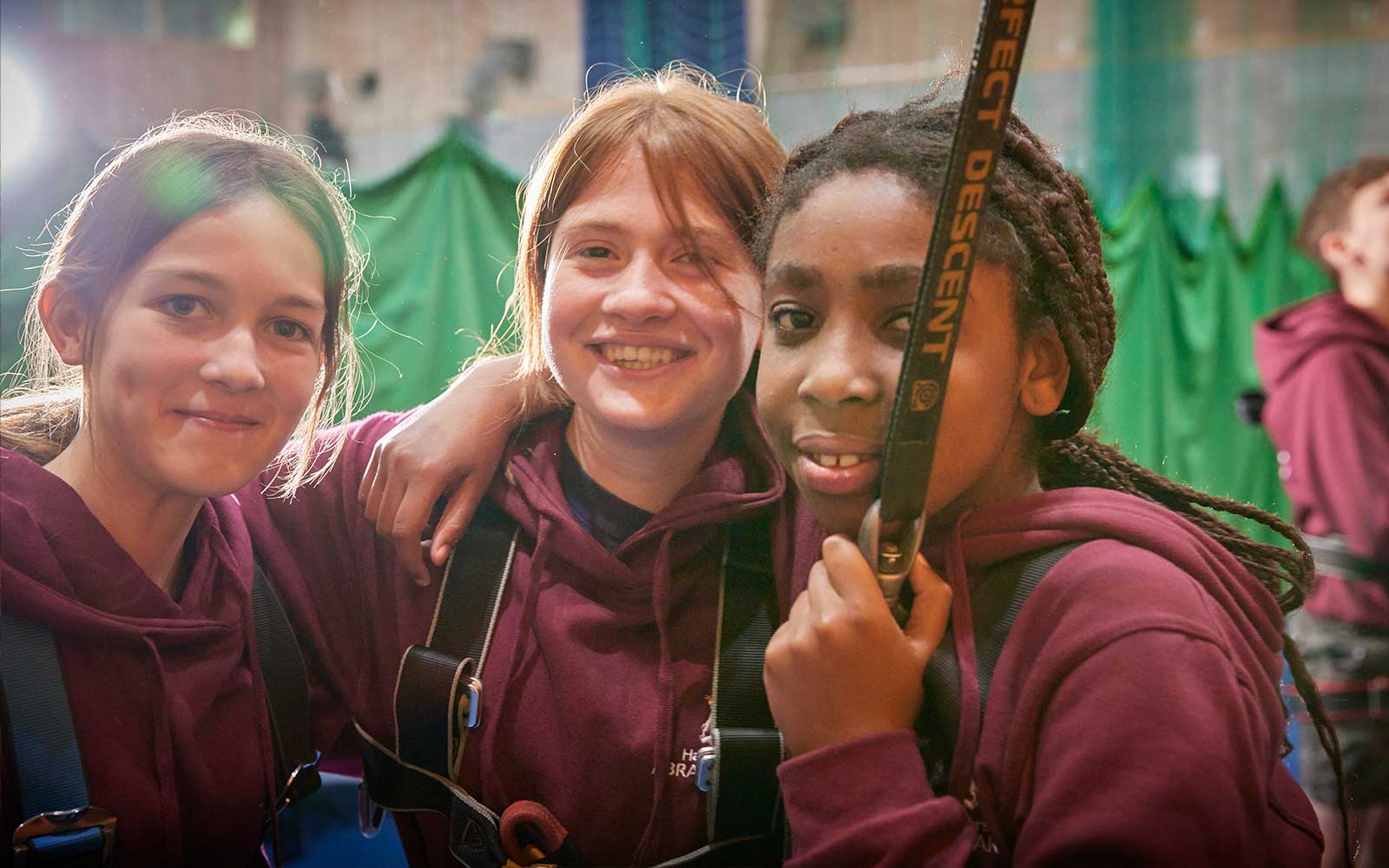Students face a number of different pressures that can lead to heightened stress levels. From the demands of educational performance to social expectations and extracurricular activities, it’s no wonder that many students experience anxiety and feel overwhelmed! As teachers, parents, and guardians, it’s essential to prioritise the mental and emotional well-being of students, especially during stressful periods like exam seasons.
One effective way to combat stress is through outdoor activities! Spending time in nature not only provides a refreshing break from screens and classroom pressures but also fosters physical health, creativity, and social connections. Engaging in outdoor activities allows students to unwind, recharge, and develop essential life skills, making it a valuable addition to their daily routines.
In this blog, we’ll explore ten outdoor activities that can help students relieve stress, along with practical tips for integrating them into their lives. Let’s dive in and discover how the great outdoors can play a crucial role in supporting our students’ mental well-being!
Why It’s Important to Help Students Reduce Stress
Managing stress is essential for students’ overall well-being and academic success. When stress levels run high, it can take a toll on both their physical and mental health, ultimately affecting their ability to learn and thrive.
- Physical Effects – Chronic stress can lead to a range of health issues, including headaches, stomachaches, fatigue, and weakened immune systems. These physical symptoms can result in missed school days, decreased participation in extracurricular activities, and an overall decline in students’ well-being.
- Mental Implications – The impact of stress on mental health is equally as concerning. Students experiencing high stress levels may struggle with anxiety, depression, and difficulty concentrating. These mental health challenges can hinder their ability to learn effectively, process information, and retain knowledge, ultimately affecting their academic performance.
- Educational Impact – Ultimately, high-stress levels can significantly disrupt a student’s education, particularly during high-stress situations such as exams or important projects. When students are overwhelmed by stress, they may find it challenging to focus, leading to decreased motivation and performance. Students who learn to manage stress effectively are more likely to excel academically and maintain a positive attitude towards their education.
By prioritising stress reduction techniques and promoting healthy coping strategies, you can help students build resilience, improve their mental health, and achieve a more positive learning environment! Engaging in outdoor activities is a practical and enjoyable way to support students in managing their stress levels and enhancing their overall well-being.
Signs of Stress In Students
Spotting the signs of stress early can help teachers and parents step in with the right support. Stress can show up in different ways, so knowing what to look for makes it easier to help students before things escalate.
- Physical Signs – Stress can take a toll on the body. Students might complain of headaches, stomachaches, or feeling constantly tired. Changes in sleep patterns and frequent illnesses can also be a sign that stress is affecting their well-being.
- Behavioural Changes – A stressed student may start acting differently. They might withdraw from friends, seem more irritable, or get frustrated more easily. A drop in academic performance, increased absences, or a general lack of enthusiasm for school and activities can also point to stress.
- Emotional Indicators – Mood swings, anxiety, and feeling overwhelmed are common emotional signs. Students might struggle to stay motivated, find it hard to concentrate, or express frustration about their workload. Being there to listen and offer reassurance can make a real difference.
By recognising these signs early, teachers and parents can help students manage stress in a healthy way. Encouraging open conversations and creating a supportive environment can go a long way in helping them feel more in control.
How Outdoor Activities Help Lower Stress Levels
Outdoor activities play a vital role in helping students manage and reduce stress. Engaging with nature provides a refreshing escape from the pressures of daily life, allowing students to recharge both mentally and physically. Research has shown that spending time outdoors can lead to lower levels of stress hormones, improved mood, and enhanced overall well-being. In this section, we will explore the various ways outdoor activities contribute to stress reduction, highlighting the numerous benefits they offer for students’ mental health and resilience. From fostering social connections to promoting physical fitness, the positive impacts of outdoor activities make them an essential part of a balanced lifestyle for students.
1. Lowers stress-hormones
Being in nature and spending time outdoors can reduce stress by lowering cortisol, the body’s primary stress hormone. Getting involved in fun and thrilling activities or even just spending time outdoors can be a great stress reliever for your students.
At PGL, we have many activities to reduce stress for students, including beach/coastal/burn walks, energetic team games, adrenaline-filled experiences and much more!
2. Gives students a break from technology
Students are constantly connected to their devices, which can contribute to stress. Outdoor activities provide a much-needed break from screens and technology, allowing students to reset their minds, engage with their surroundings, and interact with people face-to-face. Heading to an outdoor activity camp could be great for a post-exam celebration! After having their heads down in revision, work, and exams, there’s nothing better than giving them a break at an activity camp where they can have fun with friends away from the classroom.
3. Builds resilience
Outdoor activities are fantastic for building pupil resilience! Through winning, losing, and overcoming challenges, students will learn how to deal with situations so they can bounce back without getting stressed. This can have positive effects on their school and personal lives too!
4. Create new relationships & social connections
Perhaps your students are stressed with adjusting to life at secondary school. Are they finding it difficult to make new friends? Many outdoor activities involve social interaction, which is a crucial aspect of stress management. Spending time with friends and participating in team activities can provide students with a sense of belonging.
These social connections offer emotional support, reduce feelings of isolation, and create opportunities for shared experiences and laughter. That’s why our adventure camps are ideal for year 7 students as they provide opportunities for classmates to connect through team games and challenges in different ways than in the classroom.
Our Favourite Outdoor Activities to Relieve Stress for Students
Engaging in outdoor activities is a fantastic way for students to alleviate stress while enjoying the beauty of nature. Here are some of our favourite activities, along with tips on how they can incorporate these activities into their daily lives:
Go for a walk
A simple walk for your students can do a world of good! If they’re revising at home, then taking breaks for a bit of fresh air is great for resetting the mind and reducing stress. At PGL, depending on the centre you’re staying at, one of the activities available is going for a walk along the coast or even to the nearby burn.
Outdoor Games
Exercise is an amazing de-stressor. Any kind of outdoor activity or sport is a great stress reliever, whether your students play a sport on the weekend with a team or just head to the local park with their friends. We have a huge selection of outdoor activities that your students can get involved with! From watersports to high ropes and land-based challenges.
Go out with friends and family
Spending time with family and friends is always good for students if they’re feeling stressed. Talking to someone and expressing how they feel can release a lot of stress in itself. Friends always put a smile on your face, so that is just another reason why PGL outdoor adventure camps are so great: they allow students to share the epic experience with their best friends!
Gardening
Gardening is not only therapeutic but also teaches responsibility and patience. Students can start small with potted plants or flower beds at home or school. Encourage them to spend time caring for their plants as a way to unwind.
Nature Photography
This activity encourages creativity and helps students appreciate their surroundings. Provide them with a simple camera or even a smartphone and challenge them to capture the beauty of nature. This can also lead to outdoor exploration, which adds to the enjoyment.
Cycling
Riding a bike is a fantastic way to explore the outdoors while getting some exercise. Students can cycle around their neighbourhood or local parks. Setting up group cycling trips can also foster camaraderie among peers.
Picnics in the Park
Organising a picnic offers a relaxing way to enjoy nature and socialise with friends. Students can prepare their favourite snacks and spend time lounging in the sun, promoting relaxation and connection.
Hiking
Hiking allows students to explore scenic landscapes while engaging in physical activity. Whether on a local trail or a nature reserve, hiking can provide a sense of accomplishment and connection to the environment. Encourage students to seek out hiking groups or clubs to make it a social activity.
Stargazing
Observing the night sky can be a calming and awe-inspiring experience. Students can gather with friends or family for a stargazing night, learning about constellations and enjoying the peacefulness of the outdoors.
Join a sports team
Participating in a local sports team or club offers students the opportunity to stay active, make new friends, and enjoy the outdoors. Whether it’s football, rugby, or cricket, being part of a team fosters a sense of belonging and camaraderie while providing a healthy outlet for stress.
To make outdoor activities a regular part of their routines, students can create a weekly plan that includes at least three activities. They can start with manageable options, such as a 10-minute walk or a gardening session, and gradually increase the time or frequency as they become more comfortable.
Setting specific days for activities, such as “Walk Wednesdays” or “Family Picnic Sundays,” can make these outings feel enjoyable rather than a chore. By establishing these routines, students can seamlessly integrate outdoor activities into their lives, promoting relaxation and well-being.
Tips For Encouraging Outdoor Activities
Parents and teachers play a key role in inspiring students to spend more time outdoors. By creating enjoyable and accessible opportunities, outdoor activities can become a natural part of students’ routines. Here are some practical ways to encourage them:
- Establish a Routine – Setting specific times for outdoor activities each day, such as a walk before dinner or outdoor play after school, helps students incorporate fresh air and movement into their daily schedules.
- Organise Group Challenges – Fun, competitive activities like nature scavenger hunts, outdoor sports tournaments, or step-count challenges can make outdoor time more engaging, especially when done with friends or classmates.
- Offer Incentives – Small rewards, such as certificates, stickers, or simple recognition, can motivate students to try new outdoor activities. Schools and parents can create achievement charts to track progress and celebrate participation.
- Incorporate Outdoor Learning – Teachers can integrate outdoor experiences into lessons, such as nature walks for science projects, storytelling sessions in the park, or history field trips. This not only enhances learning but also encourages students to associate the outdoors with exploration and discovery.
By making outdoor activities fun, accessible, and rewarding, parents and teachers can help students develop healthy habits that reduce stress and improve overall well-being.
Outdoor Adventure Camps with PGL!
Our residential school trips offer pupils an experience they’ll never forget! Life at PGL is about adventure, fun and laughter! With fantastic group activities galore, your students will never tire of the wide range of adrenaline-fuelled activities and amazing activities into the evening too.
Our dedicated THRIVE! Programme specially focuses on wellbeing at the core. Giving your students the chance to relax and improve skills such as self-confidence, self-esteem and self-respect. Turn off from technology and step away from stress with THRIVE!
At PGL, we have an exceptional offering of trips, locations and activities to enjoy, so get in touch today to discuss your next school trip.




